Define bacteriostatic - Study guides, Class notes & Summaries
Looking for the best study guides, study notes and summaries about Define bacteriostatic? On this page you'll find 53 study documents about Define bacteriostatic.
Page 3 out of 53 results
Sort by
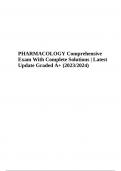
-
PHARMACOLOGY Comprehensive Exam Questions With Complete Solutions | Latest Update Graded A+ (2023/2024)
- Exam (elaborations) • 19 pages • 2023
-
- $15.49
- + learn more
Which of the following types of drugs will have maximum oral bioavailability? A. High hydrophilic drugs B. Chemically unstable drugs C. Drugs with high first-pass metabolism D. Largely hydrophobic, yet soluble in aqueous solutions - ANSWER-D. Largely hydrophobic, yet soluble in aqueous solutions Two related drug preparations show comparable ability to reach the systemic circulation in the same amounts and possess similar times to achieve peak plasma concentration. Such drugs are consider...
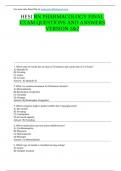
-
HESI RN PHARMACOLOGY FINAL EXAM QUESTIONS AND ANSWERS VERSION 1&2
- Exam (elaborations) • 26 pages • 2024
-
- $23.49
- + learn more
HESI RN PHARMACOLOGY FINAL EXAM QUESTIONS AND ANSWERS VERSION 1&2Which type of insulin has an onset of 30 minutes and a peak time of 2-4 hours? Choose matching definition Treats Parkinson's disease Patient may sweat May turn urine reddish brown Short aka Regular Acting Insulin: Humulin R Novulin R Velosulin Long Acting: glargine (Lantus) Clonidine (Catapres) Teaching: Self-monitoring of blood pressure is very important. Don't know? 1 of 155 Term What is is pro...
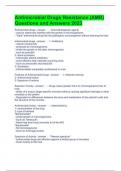
-
Antimicrobial Drugs Resistance (AMR) Questions and Answers 2023
- Exam (elaborations) • 6 pages • 2023
-
Available in package deal
-
- $18.49
- + learn more
Antimicrobial Drugs Resistance (AMR) Questions and Answers 2023 Antimicrobial drugs - Chemotherapeutic agents - used to selectively interfere with the growth of microorganisms. - "ideal" antimicrobial drug kills the pathogenic microorganism without harming the host. antimicrobial drugs 1- Antibiotics - natural compounds - produced by microorganisms - inhibit the growth or kill other microorganism - such as penicillin 2- Semi-synthetics - Chemically altered antibiotics - more...
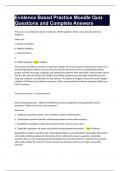
-
Evidence Based Practice Moodle Quiz Questions and Complete Solutions
- Exam (elaborations) • 9 pages • 2024
- Available in package deal
-
- $13.49
- + learn more
Evidence Practice Exam Questions with Complete Solutions When formulating the plan of care for a new admission, the nurse recognizes that evidence-based practice is most helpful to the nurse when: The nurse determines the client's nursing diagnoses. Determining the client's dietary needs Evaluating the client's outcomes of care Collecting data regarding the client's current medications - Ans: Evaluating the client's outcomes of care Rationale: A goal of evidence-based p...
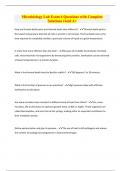
-
Microbiology Lab Exam 6 Questions with Complete Solutions rated A+
- Exam (elaborations) • 9 pages • 2024
-
- $9.49
- + learn more
Microbiology Lab Exam 6 Questions with Complete Solutions rated A+ How are thermal death point and thermal death time different? - Thermal death point is the lowest temperature that kills all cells in a broth in 10 minutes. Thermal death time is the time required to completely sterilize a particular volume of liquid at a given temperature. Is moist heat more effective than dry heat? - Because of its ability to penetrate microbial cells, moist heat kills microogranisms by denaturing the...
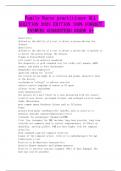
-
Family Nurse practitioner ALL SOLUTION 2023 EDITION 100% CORRECT ANSWERS GUARANTEED GRADE A+
- Other • 36 pages • 2023
-
- $11.99
- + learn more
Sensitivity defined as the ability of a test to detect a person who has the disease. Specificity defined as the ability of a test to detect a person who is healthy or to detect the person without the disease. Trauma to Kiesselbachs plexus will result in an anterior nosebleed The diagnostic or gold standard test for sickle cell anemia, G6PD anemia, and alpha or beta thalassemia hemoglobin electrophoresis questions asking for "action" the initial action might be to interview and gather ...
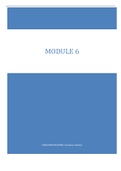
-
NURS 251 Module 6
- Exam (elaborations) • 10 pages • 2023
- Available in package deal
-
- $17.49
- + learn more
LEEN[COMPANY NAME] [Company address] MODULE 6 This study source was downloaded by from CourseH on 02-16-2022 08:55:57 GMT -06:00 Module 6 6.1 : Introduction to Infectious Diseases Infectious diseases are caused by pathogenic (disease-causing) organisms such as bacteria, fungi, and parasites as well as by viruses. Bacteria are defined as single-celled microorganisms. They can be found virtually everywhere and can either be harmless or very dangerous. This module will focus on the role of...
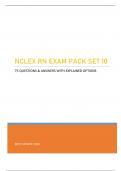
-
NCLEX RN EXAM PACK SET 10 LATEST UPDATE 2023
- Exam (elaborations) • 83 pages • 2023
-
- $37.99
- + learn more
BEST UPDATE 2023 NCLEX RN EXAM PACK SET 10 75 QUESTIONS & ANSWERS WITH EXPLAINED OPTIONS 1.1 . Question The nurse should visit which of the following clients first? o A. The client with diabetes with a blood glucose of 95 mg/dL o B. The client with hypertension being maintained on Lisinopril o C. The client with chest pain and a history of angina o D. The client with Raynaud’s disease Correct Answer: C. The client with chest pain and a history of angina The client with chest pain sh...
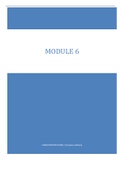
-
MODULE 6
- Exam (elaborations) • 10 pages • 2022
-
Available in package deal
-
- $15.49
- + learn more
LEEN[COMPANY NAME] [Company address] MODULE 6 This study source was downloaded by from CourseH on 02-16-2022 08:55:57 GMT -06:00 Module 6 6.1 : Introduction to Infectious Diseases Infectious diseases are caused by pathogenic (disease-causing) organisms such as bacteria, fungi, and parasites as well as by viruses. Bacteria are defined as single-celled microorganisms. They can be found virtually everywhere and can either be harmless or very dangerous. This module will focus on the role of...
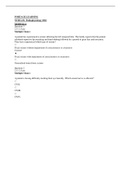
-
NURS 251 Module 6
- Exam (elaborations) • 9 pages • 2022
-
- $15.49
- + learn more
Module 6 6.1: Introduction to Infectious Diseases Infectious diseases are caused by pathogenic (disease-causing) organisms such as bacteria, fungi, and parasites as well as by viruses. Bacteria are defined as single-celled microorganisms. They can be found virtually everywhere and can either be harmless or very dangerous. This module will focus on the role of antibiotics to eliminate the pathogenic effects brought on by bacteria within a human host. Antibiotics are drugs that have the abi...

That summary you just bought made someone very happy. Also get paid weekly? Sell your study resources on Stuvia! Discover all about earning on Stuvia


